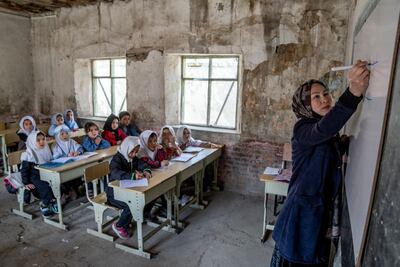It has been two years since a triumphant Taliban entered Kabul’s presidential palace, marking the end of the Afghan republic. The end was swift and decisive – but also chaotic: people trying to flee crowded the airport; pandemonium on the streets; and gun-toting fighters roaming, secure in the knowledge that they now had the upper hand.
The fraught energy of those days has since been replaced by a kind of torpor. The dust has settled on the Taliban’s victory and Afghanistan, diplomatically isolated and saddled with a misfiring economy, seems bogged down in inertia. Women and girls have been largely excluded from public life, poverty remains rife, the footprint of the international community and NGOs is shrinking, terrorist groups continue to pose a threat in some parts of the country and there seems to be little direction. According to the UN, more than 1.6 million Afghans have fled their homeland since 2021, bringing the Afghan refugee population to more than eight million people. The final Taliban push in 2021 took just a fortnight to deliver victory but winning the peace, it seems, has proven more difficult.

Afghanistan’s people have suffered far too much, and there is an urgent need for change. Effective politics always needs to be tempered by realism, and the reality here is that the Taliban are now firmly established as the sole governors of Afghanistan. Undoubtedly, the legality and morality of their claim to authority is to be questioned, but nonetheless accepting that it forms the current shape of things could be the starting point for finding ways to help the country’s people.
Intransigent refusals to engage with the Taliban have proved ineffectual. It is true that the militants are responsible for grave human rights abuses, which are often given as the reason for withholding financial support or maintaining sanctions, but the effect of these policies serves only to maintain the stalemate and has done little to persuade the Taliban to change their behaviour towards their own people. Rather it is people who are suffering the most from the current strategy of sanctions and international isolation. Establishing an international, coherent, constructive framework for working with the authorities in Kabul is long overdue. The international community, which thus far has mostly presented vague demands for “inclusivity” to the Taliban, must elaborate concrete and realistic steps that can lead Afghanistan’s rulers towards a modus vivendi.
Critics of this view, of course, raise a valid point: there is one clear demand on the table, the reopening of girls’ schools, and the Taliban have responded with empty promises. The Taliban are among the world’s most frustrating negotiators – their ideology is as rigid as it is extreme, so working with them on anything is a huge challenge. For any goodwill on the international community’s part to translate into a better life for Afghans, the militants must learn to embrace compromise. There are elements within the group who know this, and their voices should be amplified. In the meantime, however, the world must continue to explore more avenues for dialogue and persuasion, while insisting on providing Afghans with the most basic of human rights as a starting point.
There are no easy answers and no overnight solutions. There is a lack of trust on all sides. But a way out of Afghanistan’s current stasis will have to be based on some form of engagement, otherwise this inertia will still be in place this time next year. Two difficult years have passed – it is time for a new phase to emerge.


